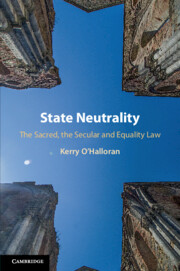Book contents
- State Neutrality
- State Neutrality
- Copyright page
- Dedication
- Contents
- Acknowledgements
- Introduction
- Part I Background
- 1 State Neutrality: Background History, Concepts, Definitions and Principle
- 2 Civil Society: Pluralism, Multiculturalism and the Church–State Interface
- 3 International Treaties, Conventions, Protocols, Courts and the European Court of Human Rights Rulings
- Part II The Benchmark of State Neutrality
- Part III Towards a More Stable Civil Society
- Conclusion
- Index
3 - International Treaties, Conventions, Protocols, Courts and the European Court of Human Rights Rulings
from Part I - Background
Published online by Cambridge University Press: 15 January 2021
- State Neutrality
- State Neutrality
- Copyright page
- Dedication
- Contents
- Acknowledgements
- Introduction
- Part I Background
- 1 State Neutrality: Background History, Concepts, Definitions and Principle
- 2 Civil Society: Pluralism, Multiculturalism and the Church–State Interface
- 3 International Treaties, Conventions, Protocols, Courts and the European Court of Human Rights Rulings
- Part II The Benchmark of State Neutrality
- Part III Towards a More Stable Civil Society
- Conclusion
- Index
Summary
Outlines the supranational framework of treaties, conventions, protocols, etc. relating to religion and explains the limited remit of the accompanying judicial and regulatory bodies. Considers the importance of the freedoms of religion, expression and association, their tendency to become entangled and their significance for the state–church relationship. Explains that a broadly similar platform of human rights and equality provisions now exists in all modern developed nations. Discusses the levelling effect of such national provisions when applied in tandem with international convention requirements. Focuses on the related case law generated by issues arising on the church–state interface, identifying governing principles from judgments delivered by the ECJ and the ECtHR, and drawing attention in particular to principles such as "proportionality" and "necessary in a democratic society". It notes those judicial rulings that specifically uphold the state’s duty of neutrality and impartiality when dealing with religious matters and the state’s right to protect its traditional primary religion and cultural identity. It identifies and discusses problematic aspects of the role of the state as it intersects with religion, such as the funding of faith schools, and considers their destabilising consequences for civil society.
- Type
- Chapter
- Information
- State NeutralityThe Sacred, the Secular and Equality Law, pp. 74 - 140Publisher: Cambridge University PressPrint publication year: 2021

